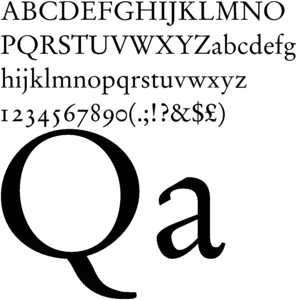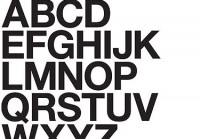The Internet: Serious Business
 The image is facetious, but I think we – you and me and everyone we don’t know – are onto something. The internet’s constraints and agilities are being used in wonderful and inventive ways. I’ve noticed writers and editors either reappropriating online aesthetics or its practical functions. Here are three examples that kind of show a spirit to this point:
The image is facetious, but I think we – you and me and everyone we don’t know – are onto something. The internet’s constraints and agilities are being used in wonderful and inventive ways. I’ve noticed writers and editors either reappropriating online aesthetics or its practical functions. Here are three examples that kind of show a spirit to this point:
I. Mark Baumer’s everydayyeah will post a 365 word story this year, running one word at a time. He chose Jesse Ball, who just published The Way Through Doors. [Blake Butler’s review forthcoming in The Believer, April.] One simply could not ‘distribute’ or publish in this form without the easy accessibility of the internet, made more so with the advent of RSS feeds and Google reader. Baumer seems obsessed with finding beauty in the redundancies of every day. True, it will take a devoted fan to check in every day, but let’s compromise: how about every week? We might even learn something about Ball’s structure.
II. Jillian Clark’s brilliant poem (haiku?) untitled under her “so i go in alone” blog post, wherein the entire poem is comprised of wikipedia picture captions.
an okapi cleaning its muzzle with its tongue
an okapi at bristol zoo cleans itself
okapi at chester zoo
an okapi reaches for some leaves
I like Stephen Dixon a lot
 Stephen Dixon’s stories, like Beckett’s, flourish despite — or perhaps because of — their constraints. There’s probably a better way to talk about it, but I think of it as ‘dense minimalism,’ wherein scarcity is conveyed through excessive means in writing. I’ve been very interested in Dixon ’s methods and with this post I will try to investigate him formally. To do this, I will use three fairly random (of course, I had to find something to get the point across, but the search was pretty casual) excerpts from 30: Pieces of a novel. My goal is to convey how constructed his narrative space is. The blockquotes are sentences from 30: Pieces of a novel.
Stephen Dixon’s stories, like Beckett’s, flourish despite — or perhaps because of — their constraints. There’s probably a better way to talk about it, but I think of it as ‘dense minimalism,’ wherein scarcity is conveyed through excessive means in writing. I’ve been very interested in Dixon ’s methods and with this post I will try to investigate him formally. To do this, I will use three fairly random (of course, I had to find something to get the point across, but the search was pretty casual) excerpts from 30: Pieces of a novel. My goal is to convey how constructed his narrative space is. The blockquotes are sentences from 30: Pieces of a novel.
Tao Lin’s “All Purpose Promotional Video”: Reviewing the wrong one
 Tao Lin offered me $2 to review an ‘all purpose promotional’ video which would be uploaded in 1-3 days, then said ‘just kidding.’ I was moved by the initial spirit behind the request and have done so (though I am reviewing the ‘wrong’ one. I will try to review the correct one too.) Please read this before viewing the movie. It will make you more excited for the movie, I hope. [I just spent five minutes trying to embed the source-code but it didn’t work, so what follows this review is a mere link.]
Tao Lin offered me $2 to review an ‘all purpose promotional’ video which would be uploaded in 1-3 days, then said ‘just kidding.’ I was moved by the initial spirit behind the request and have done so (though I am reviewing the ‘wrong’ one. I will try to review the correct one too.) Please read this before viewing the movie. It will make you more excited for the movie, I hope. [I just spent five minutes trying to embed the source-code but it didn’t work, so what follows this review is a mere link.]
REVIEW: This review will not have a point, because I don’t think the ‘all purpose promotional’ video had a point, other than being an ‘all purpose promotional’ video. I will simply describe what I saw in the order of when I saw it, with light commentary. Also, I only watched the video once, taking quick notes, so I may be wrong at points. The ‘narrative’ might not make sense due to choppy avante garde editing. READ MORE >
Blog Awards
 I am giving out awards for blogs because that’s the power that comes with being a contributor here, and I’m bored at work. The following awards are only for blogs, not websites. There have been complaints that we are too self-referential — and I guess this isn’t helping. Fortunately, I have a 50 dollar bottle of scotch at home waiting for me and I’m not that concerned with stuff.
I am giving out awards for blogs because that’s the power that comes with being a contributor here, and I’m bored at work. The following awards are only for blogs, not websites. There have been complaints that we are too self-referential — and I guess this isn’t helping. Fortunately, I have a 50 dollar bottle of scotch at home waiting for me and I’m not that concerned with stuff.
…and the whiners are
Literature Map: Fun for 5 minutes

I don’t know how scientific this is, but the results keep on moving and makes me feel it’s alive. Put in an author’s name and poof!
I put in Rick Moody (that Moody guy), Gore Vidal (that old guy), and Mishima (that guy who stabbed himself the Japanese way) and I was like, “Yah, seems about right.”
Then I put in “your mom,” and was like, “what the fuck.”
Typography: an analysis
The online literature world can be broken down into two groups: the ‘Bookish’ and the ‘Sophisticated.’ These groups convey their partisanship with fonts. The font world is broken down into either serif (Times New Roman, Garamond, Georgia) or sans-serif (Helvitica, Veranda, Arial). Of course, there are overlaps, but I’m talking about ethos here baby, shit. From editorial discretion to readership disposition, there is no denying font type. Below is an in depth analysis on the demographics of font-people.
 I. BOOKISH
I. BOOKISH
‘Bookish’ people have a lot of books on their shelves and smell like libraries. They read a lot, often dense and abstruse stuff that ‘normal Walmart people’ won’t understand. When I list serif-populated websites, you will know exactly what I’m talking about: McSweeney’s, elimae, eyeshot, Prick of the Spindle, pequin, etc. See what I mean? Now can’t you just imagine a bunch of people wearing elbow patches w/ thick-ass glasses in Cambridge reading this stuff? They are very attached to the printed word — with those lyrical cursive-esque ‘thingies.’ These people are likely to drink herbal tea in the afternoon and cry occasionally. You will find an unread copy of Mason & Dixon on their shelf. They are often pale, white, and pudgy. They have uninspired, or even ‘bad’ sex because they are always thinking about grammar.
 II. SOPHISTICATED
II. SOPHISTICATED
There’s this documentary “Helvetica” which I found really annoying. It was all these Europeans who ‘went off’ on how they changed the world with that font. Helvetica (or Microsoft’s bastardized version Arial) is used everywhere (picture the Target or JC Penney logo). There’s this idea that sans-serif fonts are more modern and ‘with the times.’ Minimalism, from which sans-serif was derived, attracts cynical people. (None of the propagators were breast-fed.) Here are examples: Muumuu House, HTMLGIANT, No Posit, (most of) Bear Parade, Robot Melon, My Name is Mud, etc. See? Now can’t you just imagine a bunch of people sitting on $2000 design chairs with their German techno in the background eating freakin’ carpaccio off of square plates? These people do not believe in God.
Conclusion: The only non-annoying font-type is braille. : : . . : .
See what I mean?
I like existentialism a lot
 I think when people talk about existentialism, they are talking about one of two things: the actual philosophy, and—more generically—books that ‘feel’ and are labeled as being existentialist.
I think when people talk about existentialism, they are talking about one of two things: the actual philosophy, and—more generically—books that ‘feel’ and are labeled as being existentialist.
Existentialism, since like Jr. year in highschool, has always been ‘cool,’ like the Smiths or the Cure, for smart and depressed people. I’m not saying I was or am smart or depressed, just that certain books made me feel less lonely, which is weird because those books and authors seemed really lonely. I guess it’s the whole ‘read to know you’re not alone thing.’
Academic existentialism is dry, difficult to understand, and makes me feel more lonely. I tried reading Being and Time, and Being and Nothingness by Heidegger [see Pink’s] and Sartre, respectively, but it was sort of like math. Every time they said a sentence, they tried to prove it using other sentences which they then had to prove. I lost track of what they were arguing (at me) about. It’s like arguing with a girlfriend, without the boobs. Most philosophy is this way: noble and boring.
The existentialism I like are the books that people call existentialism. I will name them and talk about them briefly after the break.
Supersucker: A Novel by Lee Klein
 Lee Klein, our own Massive Person No.3, wrote a novel Supersucker which can now be easily accessed as a pdf from the Supersucker page on eyeshot.
Lee Klein, our own Massive Person No.3, wrote a novel Supersucker which can now be easily accessed as a pdf from the Supersucker page on eyeshot.
(I hope I’m not stepping on any toes Lee), but if you’re a publisher, please take a look. According to Klein, it’s “a simple good-natured love story involving a woman with immaculate conception disorder and an autofellator.” It also features remarkably adroit illustrations by the author.
 Also, check out The Eyeshot Gold Star Reserve, a “best of” eyeshot.net thus far, going back into the archives for gems, including HTMLGIANT friends Blake Butler, Elizabeth Ellen, Kevin Sampsell, Jensen Whalen (Whelan?), and others.
Also, check out The Eyeshot Gold Star Reserve, a “best of” eyeshot.net thus far, going back into the archives for gems, including HTMLGIANT friends Blake Butler, Elizabeth Ellen, Kevin Sampsell, Jensen Whalen (Whelan?), and others.
There’s also Randa Jarrar’s piece which was included in Eggers’ Best Non-required Reading some years back, and my personal favorite, “Why You Should Touch My Balls,” by a mysterious Will Ratblood, who per his website, seems to be ‘around,’ however obscurely.
Everything eyeshot continues to dazzle.
David Foster Wallace Quote
 Culled from the current issue of Harper’s (January 2009), as recited by Zadie Smith at a memorial service for DFW at New York University):
Culled from the current issue of Harper’s (January 2009), as recited by Zadie Smith at a memorial service for DFW at New York University):
“[…]there’s something kind of timelessly vital and sacred about good writing. This thing doesn’t have that much to do with talent, even glittering talent…Talent’s just an instrument. It’s like having a pen that works instead of one that doesn’t. I’m not saying I’m able to work consistently out of that premise, but it seems like the big distinction between good art and so-so art lies somewhere in the art’s heart’s purpose, the agenda of the consciousness behind the text. It’s got something to do with love. With having the discipline to talk out of that part or yourself that can love instead of the part that just wants to be loved.”
So I guess it’s me quoting Harper’s quoting Zadie Smith quoting David Foster Wallace, which is I think part of the magic of words and thoughts — that they course through so many minds, residing, then spreading again.
David Foster Wallace brings back feelings of J.D. Salinger’s alter-ego/character Buddy Glass — the philosopher at the bar, the one who tells you how it is outside the classroom. Much of how I try to act comes from his Kenyon Speech. It just moved me so much, the non-academic “real-life”ness of it all.
Writing as an act of love. If that sounds cheesey, we need more cheese.

